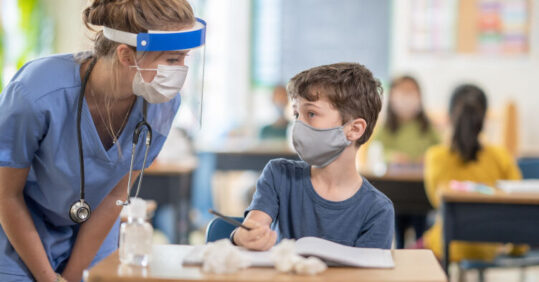School nurses must be ‘enabled to lead in the evolving public health landscape’

Action must be taken to ensure experienced school nurses are placed into ‘leadership and coordination roles’ within schools, a new study has suggested.
New research has flagged the ‘vital’ role of school nurses and stressed those in post should be enabled to ‘lead in the evolving public health landscape’.
It concluded that the pandemic highlighted the need for more school nurses and highlighted the essential role the profession plays in identifying and preventing issues which can have lifelong impacts on children.
Some 78 school nurses were surveyed – representing approximately 4-5% of those in the UK, researchers noted.
Related Article: BREAKING: Nurses to staff neighbourhood health centres under 10-year plan
In addition, over 74% reported an increase in their workload and more than 60% reported that their contact with children and families reduced during the pandemic.
One participant told the survey that during the pandemic, ‘we did not have eyes on children’ and that ‘early identification opportunities were missed so problems, once uncovered, were much more complex’.
Another school nurse said the closure of schools during the pandemic subsequently led to an ‘avalanche of referrals’ when they reopened.
She added: ‘Our findings call for advocacy by policymakers and professional organisations to enable school nurses to lead in the evolving public health landscape.
‘It calls for sufficient numbers of school nurses to respond to the emerging and ongoing health needs of children and young people.’
Meanwhile, Dr Georgia Cook, a postdoctoral researcher at Oxford Brookes University stressed the potential of school nursing professionals in leadership positions.
‘Policymakers need to recognise and promote the integral role of school nurses in carrying out preventive public health work,’ said Dr Cook.
Related Article: NHS Unite members in Wales reject pay award and signal appetite for strikes
‘Governments and local authorities could do this by commissioning school public health models that place experienced school nurses in leadership and coordination roles within school communities.’
Though this must be ‘supported by a sufficient workforce’, she added.
Key to meeting the ‘increasingly complex needs’ of children and young people following the pandemic was ‘bolstering school nurse numbers’, said Dr Cook.
Sharon White, chief executive of the School and Public Health Nurses Association (SAPHNA), which was part of the advisory board of the study, said: ‘The findings of this study further amplify the urgent need for reinvestment into the school nursing workforce.
‘As trained, skilled, experienced and highly qualified nurses, they have a critical role to play in the promotion, prevention and protection agenda for safeguarding children and young people.
‘The current exponential rise in need set against a very concerning downward school nursing workforce trajectory is of great concern regarding our ability to continue to safeguard children.’
Related Article: New ‘first-of-its-kind’ adult social care nursing faculty

See how our symptom tool can help you make better sense of patient presentations
Click here to search a symptom




